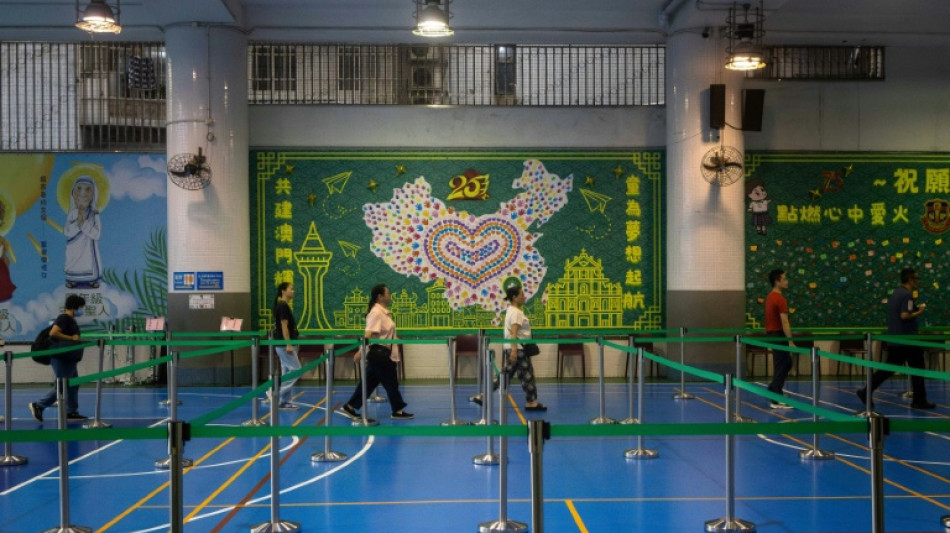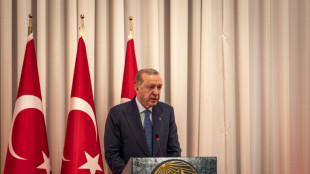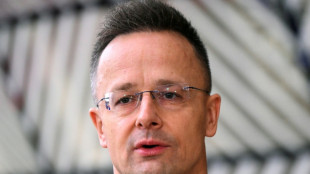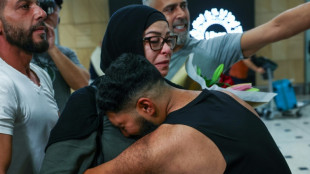
Macau's first 'patriots' election sees low turnout

Macau's first "patriots only" legislative polls on Sunday saw one of the worst turnout rates in recent years, preliminary results showed, after authorities disqualified a dozen candidates and arrested a former opposition lawmaker.
The Chinese casino hub -- with a population just shy of 700,000 -- amended its election laws in 2024, giving national security officials the final say on candidates' eligibility.
More than 175,200 residents voted to choose 14 members of the city's 33-seat legislature, with the remaining spots filled by sector-based indirect elections or by official appointment.
Officials said it was the highest number of votes cast in a legislative election since Macau reverted to Chinese rule in 1999.
But turnout was just 53 percent of more than 328,000 registered voters, putting this vote fifth out of seven elections held post-handover in terms of participation.
Political scientist Eric Sautede told AFP that Sunday's turnout was a "perfect illustration of the expression 'voting with one's feet'."
Election chiefs told a press conference they had no comment when asked about the record number of blank and invalid ballots cast -- 5,987 and 7,077 respectively.
The elections strictly adhered to the fundamental principle of "patriots governing Macau", city leader Sam Hou-fai said in a Monday statement.
- 'No real politics' -
Macau, which has its own legal system largely based on Portuguese law, enacted national security legislation in 2009 and widened its powers in 2023.
Officials in July barred 12 election hopefuls from participating on the grounds that they did not uphold Macau's mini-constitution or pledge allegiance to the city.
That same month, authorities arrested ex-legislator Au Kam-san for alleged foreign collusion -- the first known use of the city's national security law.
Chief executive Sam led efforts to boost turnout, including making public buses and trains free for the day.
An AFP reporter saw shuttle buses operated by casinos -- some of the city's largest employers -- ferrying workers to polling stations.
"The queues weren't as long this year," Un, a 60-year-old voter who declined to give his full name, told AFP after voting.
Only six candidate lists were offered on the direct election ballot, the fewest since the handover.
A 38-year-old clerk who declined to give his name said he did not register to vote.
"Even if I had a voter card, I wouldn't particularly want to vote. There's no real politics in Macau anymore," he told AFP.
"(Politics involves) public discussion, opposing voices, at least some dissenting opinions... but now there are none."
Eilo Yu, a former professor of government at University of Macau, told AFP that despite the high number of invalid votes, the turnout figures were "acceptable" to Beijing.
The disqualifications in July "represent Beijing's attempt to suppress dissenting voices within the legislature," he said, adding that he expected lawmakers to become mere rubber-stampers.
"Voters in Macau currently retain some choice. But I believe the trend is towards progressively narrowing that space," he said.
E.Accardi--INP

 London
London

 Manchester
Manchester
 Glasgow
Glasgow
 Dublin
Dublin
 Belfast
Belfast
 Washington
Washington
 Denver
Denver
 Atlanta
Atlanta
 Dallas
Dallas
 Houston Texas
Houston Texas
 New Orleans
New Orleans
 El Paso
El Paso
 Phoenix
Phoenix
 Los Angeles
Los Angeles



